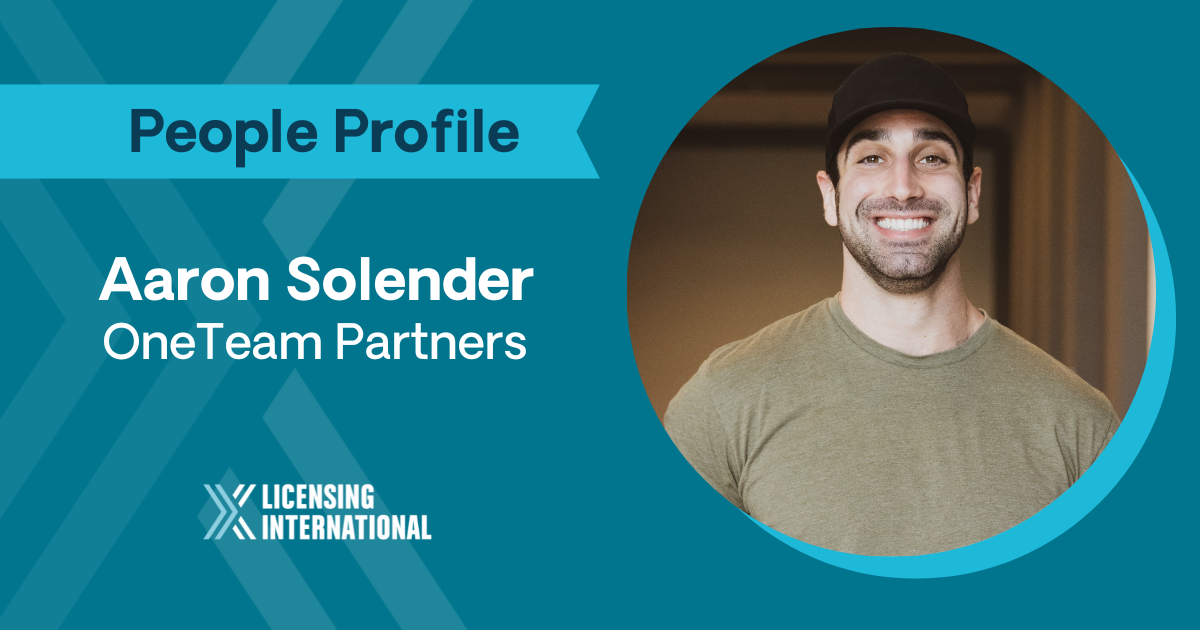People Profile: Aaron Solender, Director of College Strategy and Operations for OneTeam Partners

The global licensing community is powered by an incredible group of professionals whose diverse backgrounds and creative energy drive innovation and excellence. Each week we profile one of these professionals in this ongoing series.
How did you get into licensing (or how did licensing find you)?
Initially, I joined OneTeam Partners in a general strategy and operations role, attracted by the company’s mission of enhancing the off-field value of collective groups of athletes. However, it wasn’t until I had the privilege of working closely with Shelbi Hendricks, our SVP of Strategy, Growth, and Operations, that I truly grasped the concept of group licensing and its significance within sports. Under her excellent guidance, I developed a solid foundation in the intricacies of sports licensing. Since then, I can’t walk through a stadium or arena without annoying my friends by pointing out various in-venue consumer products along with the associated co-brands, rates, and negotiations that go into making sure the athletes are properly compensated.
What’s a “typical” day in your current position?
Well, truth be told, there isn’t really a “typical” day for me. Working on building a college NIL group licensing program is a massive undertaking in an incredibly nascent landscape that requires our team to wear a lot of hats. It’s like being on a rollercoaster where each day brings something new and unexpected. My daily responsibilities range from managing partnerships, products, and finances, to developing strategies, handling operations, and exploring new business opportunities. This dynamic environment is what makes my job both challenging and exciting.
What’s your biggest personal or professional accomplishment?
Professionally, the journey of building and scaling OneTeam’s college group licensing program has been incredibly gratifying. Empowering tens of thousands of athletes to monetize their name, image, and likeness through jerseys and in video games, all in a completely non-exclusive capacity, has been both challenging and immensely rewarding.
On a personal level, I take great pride in my entrepreneurial quests. Last year, I authored and self-published a children’s book, The Fish Who Lost His Way, which climbed to the top of Amazon’s new releases across multiple categories. Most recently, I invested in ownership of the USL Championship’s OCSC, Orange County’s sole professional soccer team. For me, these ventures aren’t just about success—they’re about seizing opportunities for creativity and camaraderie. I firmly believe that time spent on passion projects is time well invested.
What are the most significant trends or changes that you’ve seen in the business in recent years?
The entire landscape of college athletics has undergone significant tectonic shifts. From the groundbreaking legislation of athletes profiting from their NIL to ongoing legislative developments and changing attitudes toward athlete compensation and rights, college sports have been in a state of constant evolution. We’ve witnessed debates around the delicate balance between amateurism and commercialization as well as the utilization of NIL to gain competitive advantages in both recruiting and retainment. These dynamics are not only shaping the future of collegiate sports but also challenging stakeholders at all levels to rethink traditional models and practices in totally unprecedented ways.
What keeps you up at night? What’s your biggest challenge these days?
Staying ahead of all developments, understanding their potential impact on both college athletes and OneTeam’s business, and devising strategies to ensure the success of athletes and OneTeam and our partners is far from relaxing!
In your opinion, what is the top skill every licensing executive should have in order to succeed?
The ability to balance the tactical skill of deal making, the emotional aptitude for building and nurturing genuine relationships, and the commitment to never give an inch in maintaining the integrity of the intellectual property they’re responsible for licensing.
What’s the best piece of advice you’ve ever received, or what’s your favorite quote?
An old boss, colleague, and friend, Eric Winston, once casually told me that “People just like working with normal people. Just be a person, and people will enjoy working with you.” Though it may have seemed like a throwaway line to him, I saw it as a green light to be my authentic self. This mindset has propelled me further in my career than I ever could’ve imagined.
What is your favorite licensing deal of all time? (It doesn’t have to be one that was signed by you.)
Cinnabon licensing the use of their marks and logos in association with Taco Bell’s hit menu item the Cinnabon Delight. You can get them in packs of two if you just want a little sweet treat, but they also sell in 12-packs if you’re entertaining. I don’t always want a whole cinnamon roll; they’re too sweet and messy with all that icing. The Cinnabon Delight is a perfect balance. Cream-filled pastries have been a thing for centuries. Go try a Belgian éclair and thank me later.
If you weren’t in licensing, what would you be doing now?
I like to think that if I weren’t in licensing, I’d be pursuing one of three paths: either as an assistant high school football coach, hosting a game show, or perhaps even as a layabout who wins $200,000 in a lawsuit after a cab runs over his foot and works in a toll booth one day a week.
The last licensed product I bought was…
A Josh Rosen Arizona Cardinals jersey. I’m still holding out hope that he will surpass Josh Allen, Lamar Jackson, and Baker Mayfield as the best quarterback from the 2018 NFL Draft class.




